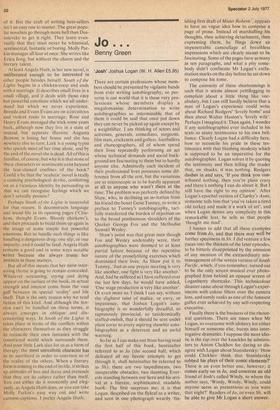Jo.. .
Benny Green
'Josh' Joshua Logan (W. H. Allen £5.95)
There are certain professions whose mem- bers should be prevented by vigilante bands from ever writing autobiography; so per- verse is our world that it is these very pro- fessions whose members display a megalomaniac determination to write autobiographies so interminable that of them it could be said that once put down they can never be picked up again except by a weightlifter. I am thinking of actors and actresses, generals, comedians, surgeons, film stars, cricketers and golfers, footballers and choreographers, all of whom spend their lives repeatedly performing an act whose technical demands and social back- ground are fascinating to them but to hardly anyone else. Admittedly each incident of their professional lives possesses some dif- ference from all the rest, but the variations are so microscopic as to be hardly apparent at all to anyone who wasn't there at the time. The problem was perfectly defined by Shaw; who, in declining an invitation from his friend the boxer Gene Tunney, to write a preface to Tunney's autobiography, tact- fully transferred the burden of rejection on to the broad posthumous shoulders of the Quaker George Fox and the Methodist Samuel Wesley.
Shaw's point was that great men though Fox and Wesley undeniably were, their autobiographies were doomed to at least partial failure because of the repetitive nature of the proselytising exercises which dominated their lives. As Shaw put it to Tunney, 'Just as one prayer meeting is very like another, one' fight is very like another.' And, had he suffered as I have suffered over the last few days, he would have added, 'One stage production is very like another'. Or even more so. I think I can say, without the slightest taint of malice, or envy, or impatience, that Joshua Logan's auto- biography is so wonderfully dreadful, so rapturously provincial, so taxidermically stuffed-owlish, that it should be sent under plain cover to every aspiring showbiz auto- biographist as a deterrent and an awful warning.
So far as`I can make out from having read the first half of this hook, hereinafter referred to as Jo (the second half, which defeated all my heroic attempts to get through it, shall hereinafter be referred to as Sh), there are two impediments, two insuperable obstacles, two daunting. Ever- ests standing between our hero and his arri- val at a literate, sophisticated, readable hook. The first surprises me; it is that Logan, described on the flyleaf as a writer, and seen in one photograph wearily 'fin-
'slung first draft of Mister Roberts', appears to have no vague idea how to compose a page of prose. Instead of marshalling his thoughts, then achieving detachment, then expressing them, he flings down an impenetrable camouflage of breathless impressions which are clearly meant to be fascinating. Some of the pages have as many as ten paragraphs, and what a pity some- body didn't confiscate Mr Logan's excla- mation marks on the day before he sat down to compose his tome.
The enormity of these shortcomings is such that it seems almost pettifogging to complain about a little thing like voc- abulary,•but I can still hardly believe that a man of Logan's experience could write about Richard Rodgers' lovely home' and then about Walter Huston's 'lovely wife'. Perhaps I imagined it. Then again, I wonder if any autobiographist ever included in his texts so many testimonies to his own bril- liance. Clearly Logan had a difficulty here, how to reconcile his pride in these tes- timonies with that blushing modesty which is supposed to be an imperative for the autobiographist. Logan solves it by quoting the testimony and then telling the reader that, aw shucks, it was nothing. Rodgers dashes in and .says, 'If you think you con- tributed nothing, then you're plain crazy and there's nothing I can do about it. But I still have the right to my opinion'. After Logan's epochal version of Charley's Aunt, someone tells him that 'you've taken a tired old turkey and made it a work of art', and when Logan denies any complicity in this remarkable feat, he tells us that people 'thought me mad'.
I hasten to add that all these examples come from Jo, and that there may well be further specimens in Sh. I did venture a few paces into the thickets of the later episodes, to be bitterly disappointed by the omission of any mention of the extraordinary mis- management of the screen version of South Pacific, which, if you remember, turned out to be the only screen musical ever photo- graphed from behind an opaque screen of Loganberry shortcake. This technicolour disaster came about through Logan's exper- iments with colour filters over the camera lens, and surely ranks as one of the funniest gaffes ever achieved by any self-respecting executive.
Finally there is the business of the rhetor- ical questions. There are times when Mr Logan, so overcome with idolatry for either himself or someone else, bursts into inter- rogative dramatics. I suppose the most idio- tic is the rap over the knuckles he adminis- ters to Anton Chekhov for daring to dis- agree with Logan about Stanislaysky: 'How could Chekhov think that Stanislaysky robbed his plays of their comic elements?' There is an even better one, however; it comes early on in Jo, and concerns an old friend of Josh's called Windy, to whom the author says, 'Windy, Windy, Windy, could anyone seem as pretentious as you were that night?' Readers of Jo, or even Sh, will be able to give Mr Logan a short answer.


































 Previous page
Previous page